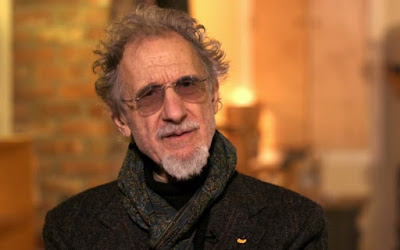There a scene in Tancrède Ramonet's fine French TV documentary, No Gods, No Masters, in which a woman during the Spanish Civil War explains to us how the factory where she worked, now taken over by the workers themselves, was able to prosper without obeisance to hierarchy, religion or government control but by simply working together toward a common goal.
It's an inspiring moment, and watching the 2016 documentary FOOD COOP -- written and co-directed (with Maellanne Bonnicel) by Tom Boothe -- finally making its way to a U.S. release via DVD, you may realize that something very like this has been existing quite successfully in Brooklyn, New York, since 1973.
Mr. Boothe, shown at right, seems to have had a double purpose in making his terrific little film: He wanted to document the history, success and workings of this Brooklyn food coop, as well as helping to use this model for a similar food coop in his adopted city of Paris, France.
That French coop, La Louve, opened its doors in November of 2017 and this month celebrates the beginning of its third successful year of offering first-class food at affordable price -- which is pretty much exactly what the earlier Brooklyn coop has been doing for nigh unto 47 years.
This busy, bustling place (above) may be located in what is now uber-wealthy and gentrified Park Slope, but back in 1973 when it began, things in Brooklyn were a lot different. Now, according to one of the folk interviewed in this eye-opening documentary, "The Food Coop is one of the only racially and economically diverse places left in Park Slope." The filmmakers give us some of the history of the coop, as well a whole lot about not only how it works but why it works as well as it does.
This is fascinating stuff, and it's not hard to understand why Boothe wanted to use Park Slope as somewhat of a model for Paris. The coop is owned by its members, you must be a member to shop there, and members must work at the coop 2-3/4 hours per month to maintain their membership. According to the founders, it is members' time -- and not their money -- that assures their loyalty and devotion.
We hear from a huge and varied number of coop members as they work, and every one of them seems both intelligent and well-spoken. One woman (above), having done a thorough comparison between the coop and Whole Foods, found the coop's prices (for much better food, by the way) around 40 per cent below that of Whole Foods for a savings of around $3,000 per year.
We learn how and why the coop is able to secure first-class food in all areas (except maybe chocolate: that section is fascinating in itself), with cheeses among the most interesting discussions. (One thing to which the movie might have devoted more time: the coop's "joining" fee, as well as its "investment" fee.)
We even get a section on discipline in the coop: What happens when there is theft of either time or food. What the filmmakers have decided to show us could hardly have been chosen any better or edited any more wisely or concisely.
In just 97 minutes we're treated to the best lesson possible in socialism vs capitalism. Nothing I've seen in the five years since having to leave New York for Florida (for economic reasons) has made me miss the city any more than this wonderful and important film. Long may this food coop survive and prosper!
From Bullfrog Films and distributed via Icarus Home Video, Food Coop hits the street this coming Tuesday, November 4 -- for purchase and (I hope) rental. On the DVD extras is a nice interview with Joe Holtz, co-founder of the coop, and a terrific one with filmmaker Boothe.





















































